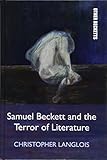Samuel Beckett and the Terror of Literature / Christopher Langlois.
Material type: TextSeries: Other Becketts : OTBEPublisher: Edinburgh : Edinburgh University Press, [2022]Copyright date: ©2017Description: 1 online resource (272 p.)Content type:
TextSeries: Other Becketts : OTBEPublisher: Edinburgh : Edinburgh University Press, [2022]Copyright date: ©2017Description: 1 online resource (272 p.)Content type: - 9781474419000
- 9781474419017
- 848/.914 23
- PQ2603.E378 Z7557 2017
- online - DeGruyter
| Item type | Current library | Call number | URL | Status | Notes | Barcode | |
|---|---|---|---|---|---|---|---|
 eBook
eBook
|
Biblioteca "Angelicum" Pont. Univ. S.Tommaso d'Aquino Nuvola online | online - DeGruyter (Browse shelf(Opens below)) | Online access | Not for loan (Accesso limitato) | Accesso per gli utenti autorizzati / Access for authorized users | (dgr)9781474419017 |
Frontmatter -- Contents -- Acknowledgements -- Series Editor’s Preface -- Abbreviations -- Introduction: Terror in Philosophy, Politics and Literature -- 1. The Terror of Thinking in The Unnamable -- 2. The Beginning (Again) and Ending (Again) of Terror in Texts for Nothing -- 3. The Writing of How It Is in the Paratactic Delay of Terror -- 4. The Terror of Passivity in Company, Ill Seen Ill Said and Worstward Ho -- Coda: Literature at the Turning Point of Terror -- References -- Index
restricted access online access with authorization star
http://purl.org/coar/access_right/c_16ec
Provides a sustained comparative reading of the relation between Beckett and Blanchot through its novel conception of the language and phenomenon of terrorSamuel Beckett and the Terror of Literature addresses the relevance of terror to understanding the violence, the suffering, and the pain experienced by the narrative voices of Beckett’s major post-1945 works in prose: The Unnamable, Texts for Nothing, How It Is, Company, Ill Seen Ill Said, and Worstward Ho. Through a sustained dialogue with the theoretical work of Maurice Blanchot, it accomplishes a systematic interrogation of what happens in the space of literature when writing, and first of all Beckett’s, encounters the language of terror, thereby giving new significance – ethical, ontological, and political – to what speaks in Beckett’s texts.Key FeaturesArticulates a novel conceptual framework through the language of terror for reading Beckett’s major post-1945 works in prose, all the while engaging with key thinkers in the discourse of contemporary critical theory like Maurice Blanchot, Emmanuel Levinas, and Alain BadiouProvides for the first time a thorough articulation of the significance of terror to Blanchot’s understanding not only of what literature is as literature, but also of the literary history of modernity that Blanchot explicitly traces from the Marquis de Sade to Samuel BeckettAffords literary studies (and Beckett and Blanchot studies specifically) a distinctive and timely voice in the veritable terror industry" of scholarly research that has proliferated in the twenty-first century against the politico-historical backdrop of the War on Terror"
Mode of access: Internet via World Wide Web.
In English.
Description based on online resource; title from PDF title page (publisher's Web site, viewed 29. Jun 2022)


